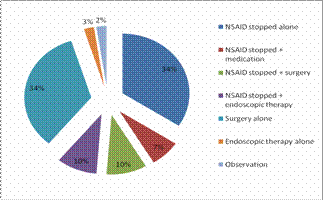P C Munipalle, D Light, T Garud
Dept. of General Surgery, Friarage Hospital, Northallerton
Introduction
Colonic diaphragm disease is a complication arising out of colonic enteropathy, which is caused by long term usage of non-steroidal anti-inflammatory drugs (NSAIDs). This condition is more commonly identified nowadays due to the increased usage of slow release preparations that make the active ingredients available in the proximal colon. Colonic diaphragm disease is an uncommon but benign disease, and hence the treatment offered shall be of minimal morbidity and mortality. The aim of this study was to systematically review the literature and to analyze the surgical and endoscopic management of colonic diaphragm disease so as to increase awareness of its management.
Methods
A literature search was conducted using the key terms ‘colon’ or ‘colonic’ in combination with ‘diaphragm’ or ‘diaphragm disease’. All cases reporting colonic diaphragms were identified using exclusion and inclusion criteria. They were analysed to collect the data pertaining to the treatment given, histology of the diaphragms and follow up data.
Results
A total of 45 cases of colon diaphragm disease were included. More than half of the patients were treated by a combination of either surgery or endoscopic dilatation, either alone or along with discontinuing usage of NSAIDs (Fig. 1). Nearly a third of the patients were treated by surgery alone. The commonest surgical procedure was anatomical resection of the strictured area and anastomosis. Emergency bowel resection has been reported in acutely obstructed or perforated patients. Laparoscopic bowel resection also has been reported. Surgical procedures gave good results, but recurrent disease requiring further procedures were also reported in those continued to use NSAIDs. Patients with disease in the lower sigmoid colon were successfully treated by endoscopic dilatation. All the resected specimens and biopsies showed benign pathology.
Follow up varied greatly, the longest reported being 2 year and 3 months. The majority of the patients had a repeat colonoscopy before the follow up was stopped.
Figure 1: treatment of colonic diaphragm disase: Systematic review results
Conclusions
A number of successful surgical and endoscopic treatment strategies are currently available for colon diaphragm disease. Colonic diaphragms in sigmoid colon seem to be ideal for endoscopic treatment. Surgery should be considered for patients with ongoing symptoms despite conservative measures.
Session: Poster Presentation
Program Number: P047

